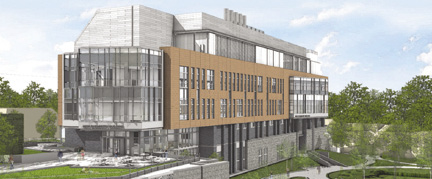The University of Rhode Island held a ceremonial groundbreaking to mark the beginning of construction on a $68 million Center for Chemical and Forensic Sciences. The center is viewed as a key component in further strengthening the University's leadership position in the health and life sciences and important to building the state's knowledge economy.
Funded in large part by a $61 million bond issue approved by Rhode Island voters in the 2010 election, the project also includes private fundraising efforts. The center will serve more than 7,000 URI students who take chemistry each year; about 40% of all URI degree programs require at least one chemistry class. The new building will provide chemistry instruction to 1,400 students a day.
"We are grateful to the people of Rhode Island for having the foresight to support a project that is directly related to the kind of economy we are trying to build in the state," said URI president David Dooley. "This facility will be a cornerstone of discovery and innovation and, in turn, economic vitality for Rhode Island."
"Chemistry is the foundation to many vital research and teaching endeavors and future jobs, whether it's in the health sciences, biotechnology, energy, the environment, pharmacy, nursing or high technology. Chemistry is both a building block and the bedrock foundation for these disciplines and many more," said Dooley.
The project is expected to create 1,200 jobs in construction, trades, architecture, engineering, management, teaching and research.
The center will triple the amount of space for teaching labs and nearly double the space for research labs compared to current facilities in Pastore Hall, which was built in 1953 to accommodate 800 students.
The center will also house one of the nation's key resources for research and training in the battle against terrorism - the U.S. Department of Homeland Security's Center of Excellence for Explosives Detection, Mitigation and Response.
To be built on the site of a former parking lot between the Chafee Social Science Center and White Hall, home to the College of Nursing, the facility will join the Center for Biotechnology and Life Sciences and the new College of Pharmacy building to complete the Health and Life Science District on the Kingston Campus' northern sector. Site preparation began in December of 2013 and completion is slated for spring 2016.
The center's design is in keeping with some of the elements of its newest neighbors in the Health and Life Science District, including sustainable design features such as the use of natural light and energy saving infrastructure components. The design also includes a generous amount of space dedicated to collaboration between faculty and students.
The main level of the five-story,135,000 s/f structure will include eight general chemistry teaching labs with support space, a 240-seat lecture hall, a 105-seat lecture hall, a study room and administrative offices. Level two will feature five organic chemistry teaching labs, an advanced chemistry teaching lab, an instrumentation lab, a 35-seat classroom and offices for faculty and lab managers. Each lab will have workstations that are compliant with the Americans with Disabilities Act. Levels 3 and 4 will feature 18 faculty research labs per floor with administrative/faculty support space.
The building was designed by Wilson Architects, Inc., of Boston, Mass, and is being constructed by Bacon Construction Co., Inc., (www.baconconstruction.com) of East Providence.
Tags:
Bacon Construction begins $68 million Center for Chemical and Forensic Sciences
June 12, 2014 - Rhode Island









